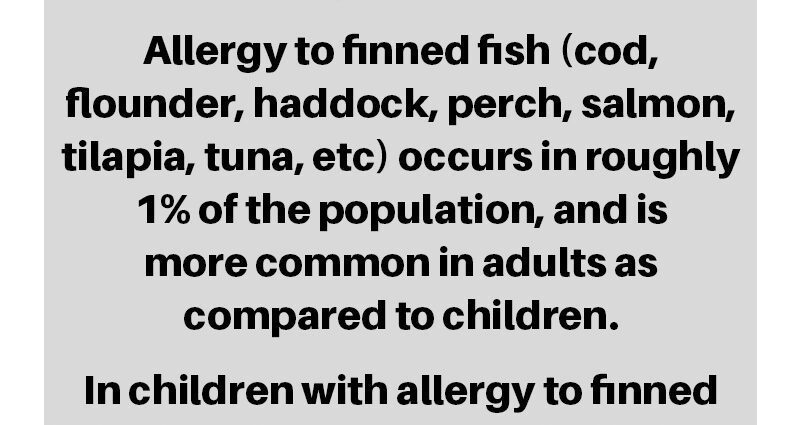Contents
- Food allergy or intolerance, what are the differences?
- Causes: Why is my baby allergic to fish? At what age ?
- Salmon, mussels, tuna… What are the foods that cause the allergic reaction?
- What are the symptoms of a fish allergy in children and infants? How does it manifest itself?
- How to react and what to do when faced with a fish allergy?
- Treatment: how is a fish allergy treated?
The allergic reaction is an abnormal reaction of the immune system to a specific food, which you can see in your newborn baby from the start of their food diversification. If your baby has a skin reaction or sneezes after eating fish, he may be allergic to it.
Food allergy or intolerance, what are the differences?
First of all, it is important not to confuse intolerance and food allergy, as Ysabelle Levasseur emphasizes: “Intolerance to fish can manifest itself through uncomfortable symptoms like an upset stomach. It may be advisable to consult a doctor in this case. As for allergy, it is a much more serious phenomenon which must require a rapid (even urgent) consultation with the pediatrician or attending physician.«.
Causes: Why is my baby allergic to fish? At what age ?
The causes of allergy are often difficult to explain, but often, the genetic factor is in the game for food allergies, as Ysabelle Levasseur reminds us: “If parents are allergic to fish themselves, the risk of their child contracting these same allergies is greater.“. It should also be noted that fish allergy generally appears around the age of 1 year in children, as with egg allergy.
Salmon, mussels, tuna… What are the foods that cause the allergic reaction?
But when we talk about fish, it’s wide !! What species of fish are susceptible to a food allergy? Are there any exceptions among the underwater fauna? Ysabelle Levasseur disputes this theory: “Fish allergy is due to a protein present in all species of fish. You should also avoid fish-based sauces or even surimis. Although it is rarer for children to eat it, fish eggs like caviar can also be allergenic foods. Some very allergic children may even have a reaction via cooking vapors or simple skin contact, like getting a kiss from someone who has eaten fish“. However, be aware that it is the allergist doctor who will test the fish to avoid on a case-by-case basis.
What are the symptoms of a fish allergy in children and infants? How does it manifest itself?
The symptoms of an allergic reaction to an allergenic element are many and diverse, but often crossed and dangerous, as Ysabelle Levasseur emphasizes: “Without the symptoms of a fish allergy, there are Rashes, such as hives or eczema. There may also be more common symptoms such as a runny nose or sneezing in a case of allergy. From digestive disorders may also appear as vomiting, abdominal pain or diarrhea. The most serious symptoms are usually respiratory, with the appearance of asthma attacks or angioedemas. Anaphylactic shock is the most dangerous reaction which can lead to unconsciousness or even death if not treated medically in time. It should also be noted that an allergic reaction is triggered very quickly, within an hour or even minutes following the ingestion of the allergenic food or inhalation of the cooking vapors.«.
How to react and what to do when faced with a fish allergy?
If your child has ingested a food to which he is allergic, you must act quickly: “An allergy is de facto an emergency. See a doctor as soon as possible when the first symptoms appear“, Says the dietician-nutritionist. Usually, infants who have their first allergy have a less severe reaction but it is necessary to see quickly an allergist doctor if you have any doubts. If you are allergic to the food, you will be provided with a kit including an adrenaline injection pen to use if your child has a serious reaction.
Treatment: how is a fish allergy treated?
Unfortunately there is unlikely to be cured of a fish allergy. Unlike an egg allergy, people who are allergic to fish continue to be allergic into adulthood. As for the treatments, there aren’t really any either. If the allergist diagnoses an allergy, he will recommend a foreclosure diet consisting in removing any food likely to cause an allergic reaction.
There are also natural antihistamines that may alleviate allergic reactions, but they are in the order of naturopathy : the soothing effects are therefore not recognized by the entire medical profession and do not serve as treatment. On the other hand, research seems to show that probiotics could have a beneficial effect on fish allergies. These are still at the experimental stage: we will therefore have to be patient!
If your child’s fish allergy diagnosis is proven, you will have to find the right words to explain to him that he can no longer eat certain foods, as Ysabelle Levasseur advises: “The child should not be subjected to the allergy as a punishment. We must be clear in our explanation by telling him that certain foods can endanger him, but we can stay positive by showing the child that we can eat lots of good things that are not made from fish!«.
In addition, you will also have to contact everyone around you to warn them that your child should not eat fish under any circumstances and should be kept away from smoke fumes and contact if the allergy is severe. At school, school life must be prevented in order to set up a Individualized Reception Plan. This will make it possible to concoct menus adapted for the allergic child in the canteen.










